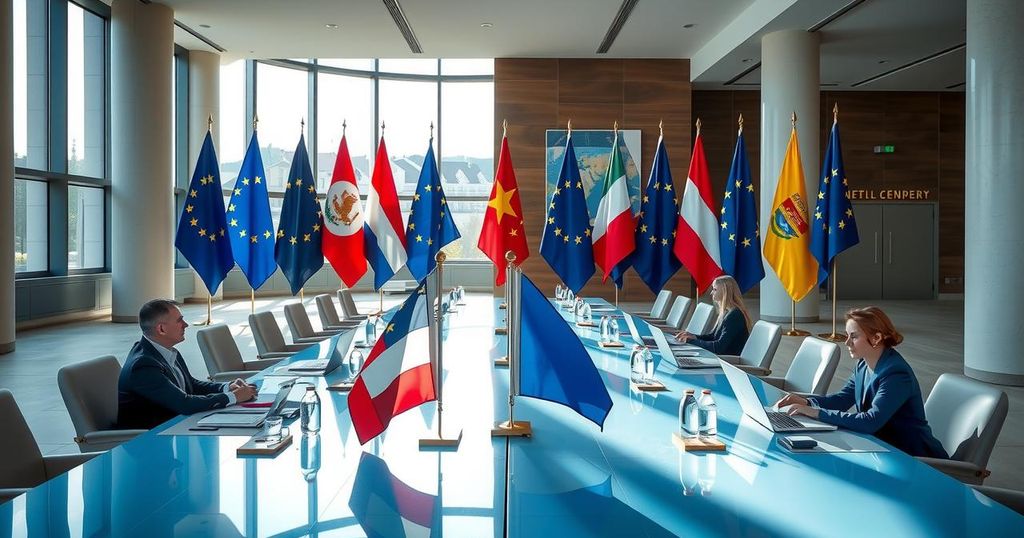Global news
ABBAS ARAGHCHI, ASIA, CIVIL DISOBEDIENCE, DONALD TRUMP, EUROPE, FOREIGN POLICY, FOX NEWS, GENEVA, INTERNATIONAL RELATIONS, IRAN, ISRAEL, JA, JACQUI HEINRICH, KA, KAROLINE LEAVITT, LEA, LEAVITT, NORTH AMERICA, NUCLEAR POLICY, SANCTIONS, STEVE WITKOFF, SWITZERLAND, TRUMP, U. S, UNITED STATES, US-IRAN RELATIONS, WHITE HOUSE
Jamal Walker
0 Comments
Iran Talks with Europeans Set for Friday; White House Sees ‘Substantial Chance’ for Renewed Negotiations
Iranian Foreign Minister Abbas Araghchi will meet with European leaders in Geneva on Friday. The White House sees a “substantial chance” for renewed negotiations regarding Iran’s nuclear program. Press Secretary Karoline Leavitt emphasized the need for no uranium enrichment as part of any deal, highlighting the threat posed by Iran’s nuclear ambitions. Diplomatic discussions continue amid rising tensions.
Discussions between Iran and European leaders are set to take place this Friday in Geneva, as the U.S. signals a willingness to resume negotiations on Iran’s nuclear program. The White House has indicated there exists a “substantial chance” for renewed dialogue amid rising tensions in the Middle East, particularly since hostilities resumed in June. The meeting will include high-profile figures such as Iranian Foreign Minister Abbas Araghchi and top diplomats from France, the UK, and Germany.
Amid rumors of President Trump’s potential military action in support of Israel, White House Press Secretary Karoline Leavitt confirmed that U.S. officials and their Iranian counterparts have engaged in six rounds of talks during the ongoing crisis. However, it remains unclear if U.S. Special Envoy Steve Witkoff will attend the meeting in Geneva, as the administration pursues a diplomatic solution.
During a press briefing, Leavitt reiterated President Trump’s hardline stance, making it clear that any negotiations must guarantee no further enrichment of uranium by Iran. “Iran has never been closer to obtaining a nuclear weapon,” she warned, emphasizing that the country could produce such a weapon in a matter of weeks if their supreme leader decides to go ahead.
However, Leavitt also framed the current diplomatic push as a viable route, stating, “Iran is absolutely not able to achieve a nuclear weapon. The deal that Special Envoy Witkoff proposed was both realistic and acceptable. Trump believes Iran can and should make a deal or face significant consequences.”
Comments from French Minister Jean-Noël Barrot highlighted a collective commitment from European nations, emphasizing readiness to leverage their expertise to rein in Iran’s nuclear ambitions. Discussions at the convoluted intersection of diplomacy and conflict also include commitments not just to arms negotiations but wider concerns about regional stability.
In a related note, U.S. Secretary of State Marco Rubio had a meeting with U.K. Foreign Secretary David Lammy, reinforcing a unified front against Iran’s nuclear pursuits. While specific details remain sparse, the White House will not commit to any outcomes but indicated that all options are under consideration as the situation continues to evolve.
Leavitt closed by stating that any decisions regarding U.S. military involvement would be made within weeks, contingent on the outcomes of these negotiations and Iran’s responses. Overall, the Friday talks represent a crucial juncture in the ongoing efforts to address Iran’s nuclear program amidst escalating tensions in the region.
The upcoming talks between Iran and European leaders signal renewed hopes for negotiation efforts regarding Iran’s nuclear program, with the U.S. expressing a willingness to engage but maintaining a hardline approach. With both diplomatic discussions and the potential for military action looming, all eyes are on how Iran responds to international pressure while navigating a fragile geopolitical landscape. The outcome of these talks on Friday will be critical to shaping future relations and stability in the region.
Original Source: www.foxnews.com




Post Comment